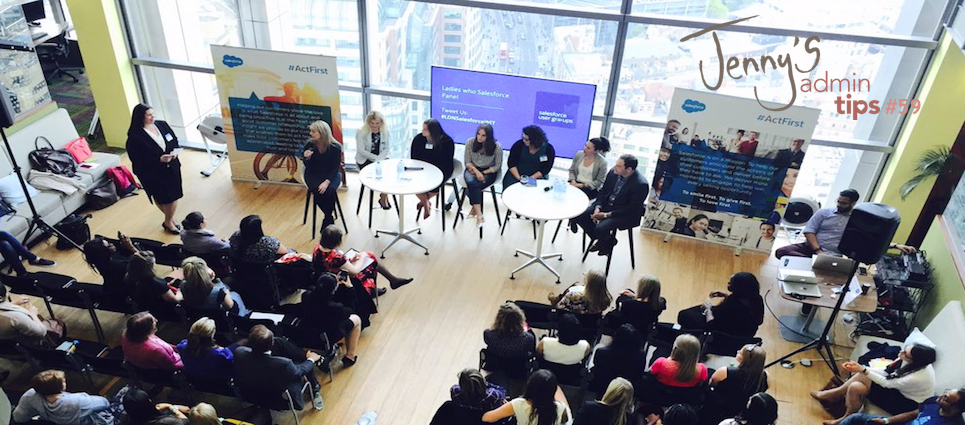Last week I was fortunate enough to be apart of the amazing Women who Salesforce panel at the SFDCWiT event in London. Not only was this event inspiring, thought provoking and enlightening, but it was a chance to articulate some of the unspoken feelings attached to gender issues in the workplace. It created a united and empowered audience whose key objective was to discuss – how to get more women in STEM?
The event took place at Salesforce Tower against the breathtaking backdrop of the city of London. Kicking off with an inspirational keynote from Anne-Marie Imafidon – Head Stemette, it wasn’t long before the audience was spellbound. I mean how could they not be? Anne-Marie captivated the room with her account of how we can all work to enable the next generation of women into STEM. Through her championing of mindfulness, empathy and technology, she is successfully transforming our preconceived notions of what a career in STEM represents. Anne-Marie has used her Outbox Incubator initiative as a vehicle to communicate this vision to audiences around the world.
If you haven’t heard of Anne-Marie, Stemette, or the Outbox incubator then I highly encourage you to watch Anne-Maries TedTalk here, take a look into the Outbox Incubator here, catch her at the Salesforce London World Tour here, and help get the next generation of women into STEM, now.
After Anne-Marie’s keynote, the Salesforce Women Who Tech panelist took to the stage. The panel included Louise Lockie, Gemma Davies, Adam Seligman, Doina Popa, Eileen O’Mara, Alejandra Sivori and I. We were asked a number of questions by host Jodi Wagner that both the audience and panellist were equally eager to listen to and answer.
The discussions that ensued may not be the usual kind of office chat, but it was a unique opportunity to get away from the everyday workplace and really dissect these gender bias issues that affect us all, men and women.
Here are some of the Q&As.
Q. Unconscious bias – How do we help men and other women understand this in the development and recruitment processes?
- It starts with awareness. Most believe that they are unconstrained by prejudice, however unconscious bias exists in all of us. Once we address that these biases exist, either by doing workplace unconscious bias awareness training, take the Implicit Association Test (IAT) to measure attitudes and beliefs, and consider the influences that have these biases in the first place e.g. social and workplace norms etc, only then can you begin to have a fair recruitment process.
- Have a more planned and structured recruitment process. Stick to a set of questions, mix up the interviewers and report on interview outcomes; You may identify trends in the hiring process that restrict diversity in the workplace.
- Ann Marie encouraged the #LDNSalesforceWiT to join TechChaterUK for tips to increase the number of women applying for roles in technology.
Q. I’ve often heard it said that women don’t put themselves forward for positions unless they are overqualified whereas men will go for jobs they fancy regardless of meeting all the criteria. I do believe this to be the case but why is it AND how do we overcome this blocker? Any tips?
- Teach girls to to be Brave NOT perfect – this is the message from one of the most inspiring leading women in tech – Reshma Saujani, founder of Girls Who Code, on a recent TedTalk presentation. “Even when we are in ambitious, even when we are LeaningIn that socialisation of perfection has caused us to take less risks in our careers.” The message – “Socialise to be brave, not perfect.” You can Listen to the full TedTalk presentation here.
- Gemma Davies suggested watching Amy Cuddy’s TedTalk about body language and how it affects how people perceive us. It’s amazing how sitting up straight can change the way you think and behave. Seriously. Check out Amy’s TedTalk – Your body language shapes who you are, here.
Q. What do you think is the biggest barrier to women succeeding in STEM careers?
- There appears to be a lack of encouragement, especially from a young age. Ann-Marie addresses this perfectly by providing a platform for encouragement for young girls with OUtbox Incubator.
- School Education. We need to acknowledge and work to eradicate the stereotypes prevalent in our school system E.g. boys are better at engineering than girls are.
- We need to address the ‘Social norms’ e.g. females playing more STEM related roles in movies like Sandra Bullock who played an astronaut in Gravity, rather than the stereotypical geeky men in ‘The Big Bang Theory’.
There were many more questions asked which generated lots of conversation. Freya Crawshaw – leader of the SFDCWiT UG, has composed a great picture overview of the entire evening here which will give you more information about the event.
Salesforce Tower may have provided powerful views of an cosmopolitan city, free of anything as outdated as gender defined stereotypes and bias, but it was the attendees – men and women, the keynote speaker – Anne-Marie Imafidon and the thoughts and opinions of the panellist, the audience and not forgetting the power women that is Jodi Wagner, that provided the most compelling views of all when it comes to Women in Tech.
Thanks for a great evening Jodi and the SFDCWiT UG team!
See you next week.
Jenny

